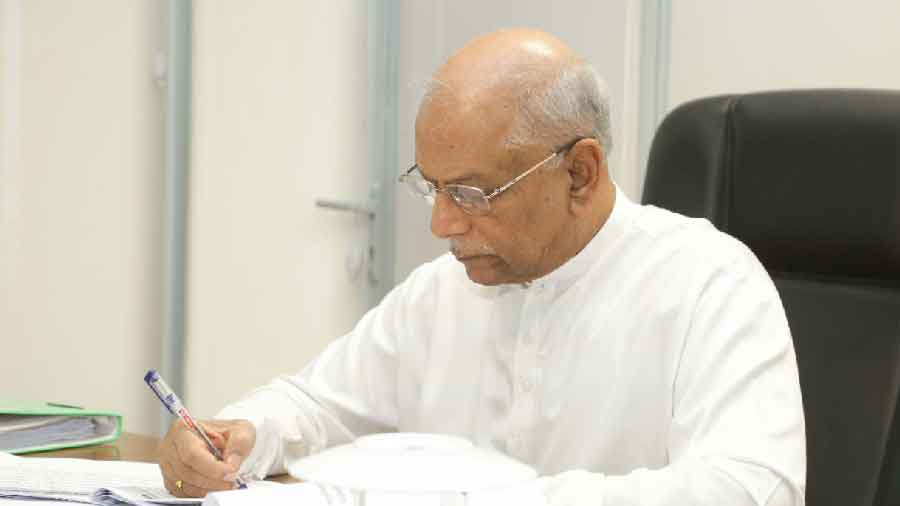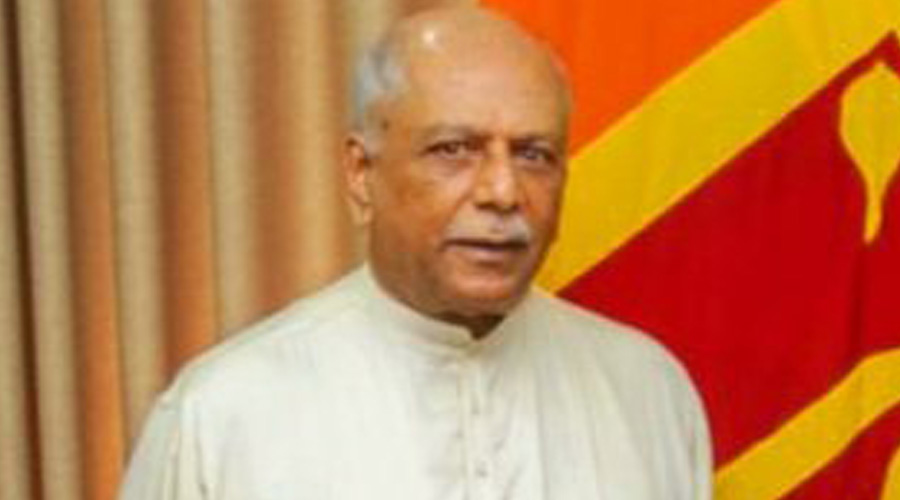Sri Lanka's newly-elected President Ranil Wickremesinghe on Friday appointed Dinesh Gunawardena, a loyalist of the Rajapaksa family, as the Prime Minister in a bid to restore political stability and mitigate the worst economic crisis that has virtually bankrupted the country.
The formation of the new government by Wickremesinghe took place hours after Sri Lankan troops and police armed with assault rifles and batons forcibly removed anti-government protesters camped outside the presidential office here in a pre-dawn raid.
Social media posts showed officers dressed in riot gear pulling down protest tents and arresting several demonstrators. Banners that were hung from top of the secretariat have also been removed.
Sri Lanka has seen months of mass unrest over an economic crisis and many blame the former government led by ousted president Gotabaya Rajapaksa for mishandling the island nation's finances.
The forcible removal of protesters, criticised by the Opposition as well as by several Western envoys here, is seen as a signal that President Wickremesinghe, 73, will crack down on anti-government demonstrators who forced the ouster of his predecessor Rajapaksa.
Wickremesinghe, who was appointed acting President by Rajapaksa was officially sworn in as the country's President on Wednesday after he was elected by Parliament on July 20.
The 18-member Cabinet was sworn in on President Wickremesinghe's first day in office.
Ali Sabry, who earlier headed the finance ministry, was appointed as the foreign minister.
He has been chosen to be the foreign minister for his articulate skills and his ability to deal wit the international partners, including the International Monetary Fund, analysts said.
Prime Minister Gunawardena, 73, has been given an additional portfolio of Public Administration, Home Affairs, Provincial Councils and Local Government.
The rest of the ministers were retained with their same portfolios while President Wickremesinghe continues to hold the crucial ministries of finance and defence.
Wickremesinghe said he was taking steps to form an all-party government to handle the island's worst-ever economic crisis.
A stalwart of Sri Lankan politics, Gunawardena, 73, earlier served as the foreign minister and education minister. He was appointed as Home Minister in April by then President Gotabaya Rajapaksa.
The prime minister's post fell vacant after Wickremesinghe, 73, was on Thursday sworn in as the country's eighth president after Gotabaya Rajapaksa fled the country and then resigned as president.
A schoolmate of President Wickremesinghe, Gunawardena, has held various Cabinet posts in the past.
Meanwhile, police have described the the pre-dawn raid on the main camp of the anti-government protesters as a "special operation to take [back] control of the presidential secretariat".
The protesters had vacated the President and Prime Minister's residences and the Prime Minister's office after capturing them on July 9, but they were still occupying some rooms of the President's secretariat.
They also refused to accept Wickremesinghe as the new president, holding him partly responsible for the country's unprecedented economic and political crisis.
The main protest group which blocked entry to the President's Office since April 9, said they would continue their struggle till Wickremesinghe resigned.
The new Sri Lankan government has been criticised for using force to remove the anti-government protesters, with Ambassadors and High Commissioners posted in Colombo expressing worry over the Friday morning raid.
US Ambassador to Sri Lanka Julie Chung said she was deeply concerned about actions taken against protestors in the middle of the night.
"We urge restraint by authorities and immediate access to medical attention for those injured," she tweeted.
British High Commission to Sri Lanka Sarah Hulton also tweeted that she was concerned about reports from the Galle Face protest site.
She said in a tweet that her stance on the importance of peaceful protest was clear.
The official Twitter handle of the European Union in Sri Lanka said the "freedom of expression" was essential to the current transition to power in the crisis-hit island nation, and added that it was hard to see how restricting the [freedom of expression] severely could help in finding solutions to the current political and economic crises.
Sajith Premadasa, Leader of the Opposition of Sri Lanka and the Leader of Samagi Jana Balawegaya party said excessive force has been used against the protesters.
"There is no denying there was excessive use of force and it was uncalled for. Nothing can justify this inhumane act, the law must be followed by all," he said.
Wickremesinghe has said that the occupation of government buildings was illegal, warning that legal action would be taken against their occupiers.
The new president said he would extend support to the peaceful protesters but would be tough on those who try to promote violence under the guise of peaceful protests.
Protesters set Wickremesinghe's personal residence on fire and occupied his office during protests last week.
Sri Lanka, a country of 22 million people, is under the grip of an unprecedented economic turmoil, the worst in seven decades, leaving millions struggling to buy food, medicine, fuel and other essentials. Sri Lanka's total foreign debt stands at USD 51 billion.












